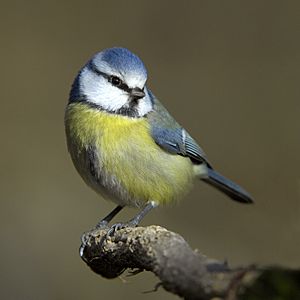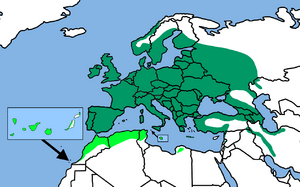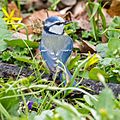Blue tit facts for kids
Quick facts for kids Blue tit |
|
|---|---|
 |
|
| Conservation status | |
| Scientific classification | |
| Kingdom: | |
| Phylum: | |
| Class: | |
| Order: | |
| Family: | |
| Genus: |
Cyanistes
|
| Binomial name | |
| Cyanistes caeruleus |
|
 |
|
The blue tit (scientific name: Cyanistes caeruleus) is a small, colorful songbird. It belongs to the Paridae family. These birds are about 10.5 to 12 centimeters (4.2 to 4.8 inches) long. That's about the length of a small smartphone!
Blue tits are very common and live in many places. You can find them across temperate and subarctic Europe and western Asia. They prefer deciduous (trees that lose leaves) or mixed woodlands. Most blue tits stay in one place and do not migrate for winter.
Blue Tit Behavior
Blue tits are very active and clever birds. They often join with great tits in winter to form large flocks. Blue tits are amazing gymnasts! They can hang upside down on thin branches. They might even hop up a tree trunk like a treecreeper.
These birds usually roost (sleep) in thick ivy or other evergreen plants. When the weather is very cold, they will find shelter in a hole. Blue tits are known for being very agile. They can hang from almost any spot to find food. A blue tit usually lives for about 1.5 years.
What Blue Tits Eat
Blue tits are helpful birds because they eat many pests. They love to eat young buds from different trees. They might even pull buds apart to find insects hiding inside. Blue tits eat a lot of tiny insects called coccids and aphids. These insects can harm many plants.
They also enjoy eating leaf miner grubs and green tortrix moths. Like other birds in their family, blue tits also eat seeds. Their diet helps keep gardens and forests healthy.
How Blue Tits Learn
Blue tits are known for their ability to learn from each other. In the 1960s, something interesting happened in Britain. Blue tits learned how to open traditional milk bottles. These bottles had foil tops, and the birds would open them to get the cream.
This behavior spread from one bird to another. It's a great example of how animals can learn new things. Today, this behavior is less common. This is because milk is now sold in different containers. Also, fewer people get milk delivered to their homes.
Images for kids
See also
 In Spanish: Herrerillo común para niños
In Spanish: Herrerillo común para niños
 | Stephanie Wilson |
 | Charles Bolden |
 | Ronald McNair |
 | Frederick D. Gregory |







